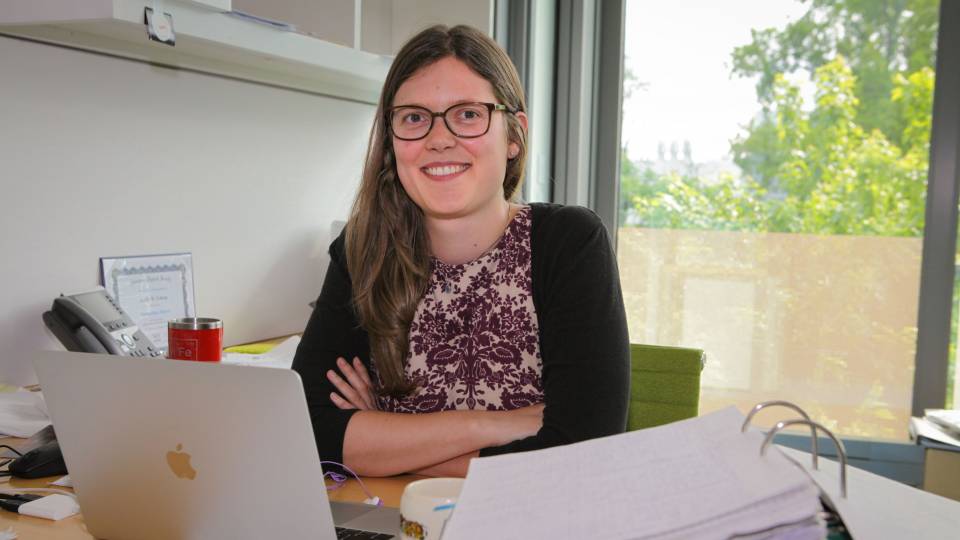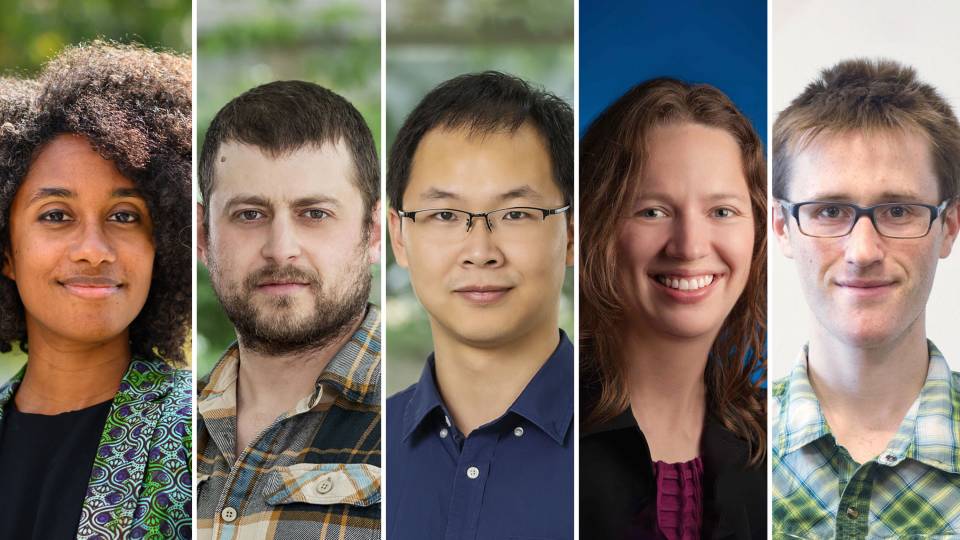Five Princeton faculty members have been selected by the Alfred P. Sloan Foundation as 2021 Sloan Research Fellows(Link is external). The five are among 128 early career scholars whose achievements and potential place them among the next generation of scientific leaders in the United States and Canada, according to the fellowship announcement.
Sloan Research Fellows are selected on the basis of their independent research accomplishments, creativity and potential to become leaders in the scientific community. The fellowship carries a $75,000 award for support of their research over a two-year period.

From left: Biao Lian, Leslie Schoop, Christopher Neilson, Yakov Shlapentokh-Rothman, Mark Zhandry
The five Sloan Research Fellows from Princeton:
Biao Lian(Link is external), assistant professor of physics(Link is external), conducts theoretical studies of topological phases of matter and related systems. He also explores connections between condensed matter and high-energy theories. Prior to joining the faculty in 2020, Lian was a postdoctoral fellow at the Princeton Center for Theoretical Science. He earned his Ph.D. at Stanford University and his B.S. at Tsinghua University.
Leslie Schoop(Link is external), assistant professor of chemistry(Link is external), works at the interface of chemistry and physics, using chemical principles to find new materials with exotic physical properties. She is an associated faculty member of the Princeton Institute for the Science and Technology of Materials(Link is external) (Link opens in new window) and the Princeton Center for Complex Materials(Link is external) (Link opens in new window). Schoop earned her B.A. at Johannes Gutenberg University in Mainz, Germany, and her Ph.D. at Princeton University. She completed postdoctoral research at the Max Plank Institute for Solid State Research in Stuttgart, Germany. In 2020, Schoop was awarded a Packard Fellowship for Science and Engineering from the David and Lucile Packard Foundation.
Christopher Neilson(Link is external), assistant professor of economics(Link is external) and public affairs(Link is external), is an applied microeconomist who studies public policies and regulation in education markets to understand the behaviors of students, families and education providers. Neilson is jointly appointed at Princeton’s Department of Economics(Link is external) and the Princeton School of Public and International Affairs(Link is external). He is a member of the Industrial Relations Section(Link is external) and Education Research Section(Link is external) at Princeton University and a member of the National Bureau of Economic Research(Link is external) Industrial Organization and Education Economics program. Neilson earned his B.A. and M.S. at the University of Chile and his Ph.D. at Yale University.
Yakov Shlapentokh-Rothman(Link is external), assistant professor of mathematics(Link is external), studies partial differential equations, general relativity, and other topics that influence our understanding of space, time and black holes. Shlapentokh-Rothman earned his B.S. at Stanford University and his Ph.D. at the Massachusetts Institute of Technology (MIT).
Mark Zhandry(Link is external), assistant professor of computer science(Link is external), focuses primarily on cryptography, which protects digital information such as credit card numbers, log-in credentials and other secure electronic transactions. His research explores the potential for quantum computing to break the cryptography in use today, as well as ways to strengthen cryptography. In 2018, he received a National Science Foundation CAREER(Link is external) award, a prestigious source of support for early-career researchers. Zhandry completed postdoctoral studies at MIT, earned his Ph.D. from Stanford University, and earned his B.A. at the University of California-Berkeley.
Candidates are nominated by fellow scientists, and winning fellows are chosen by an independent panel of senior scholars. With this year’s awardees, 234 Princeton faculty members have received the fellowship since its inception in 1955.






